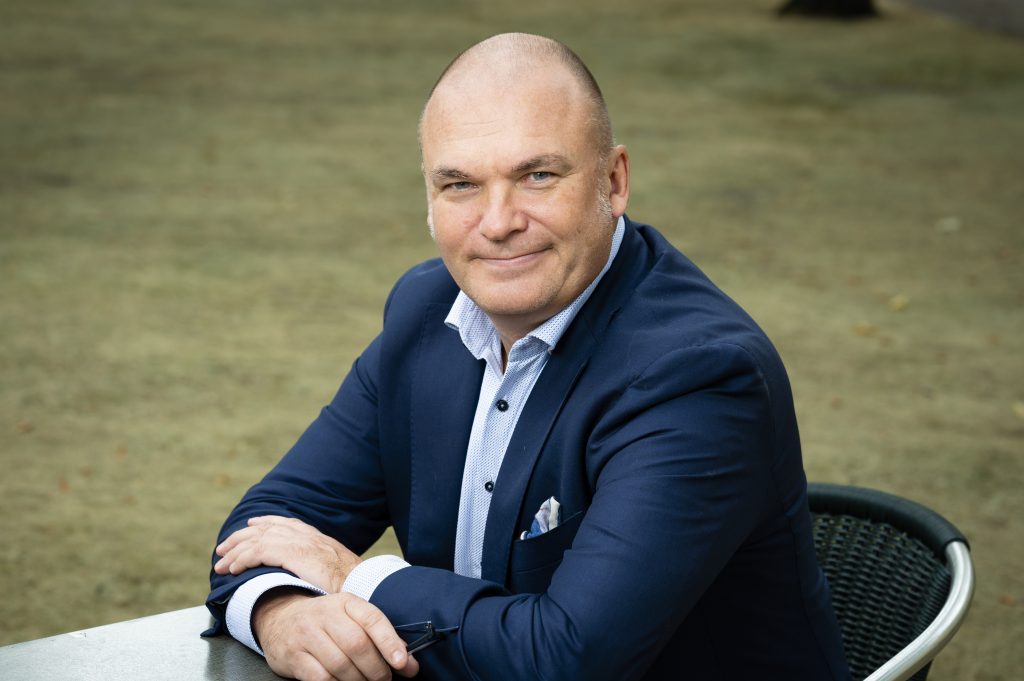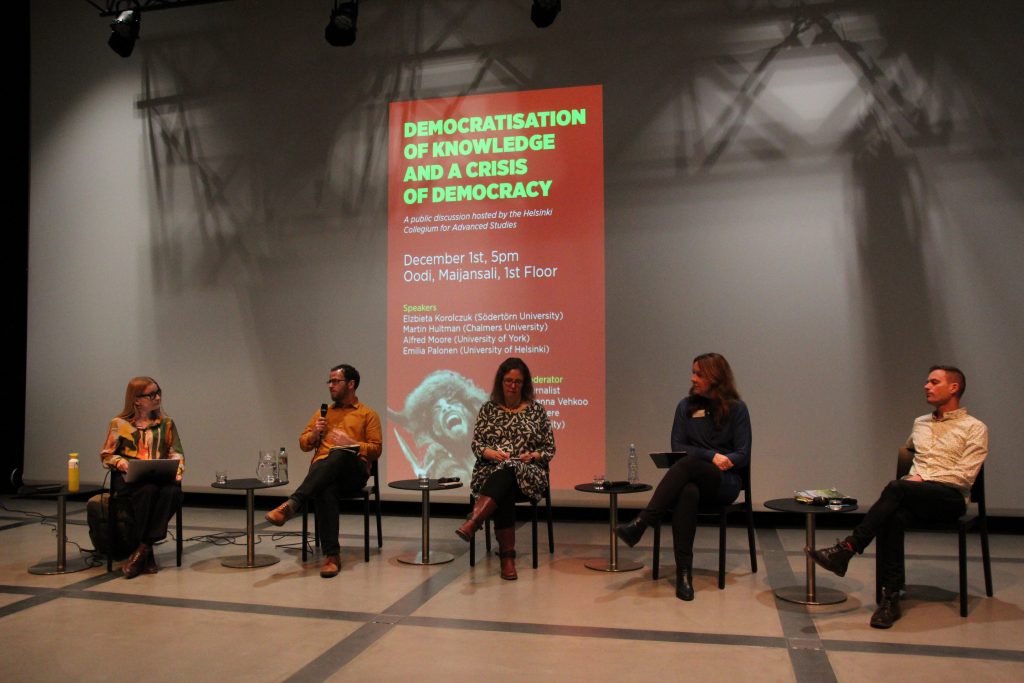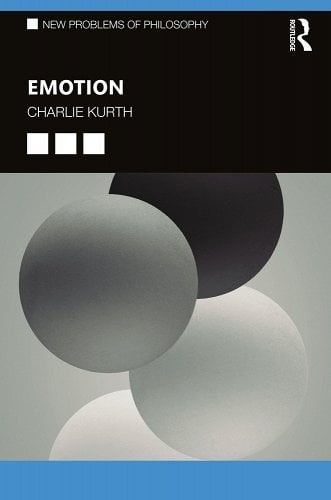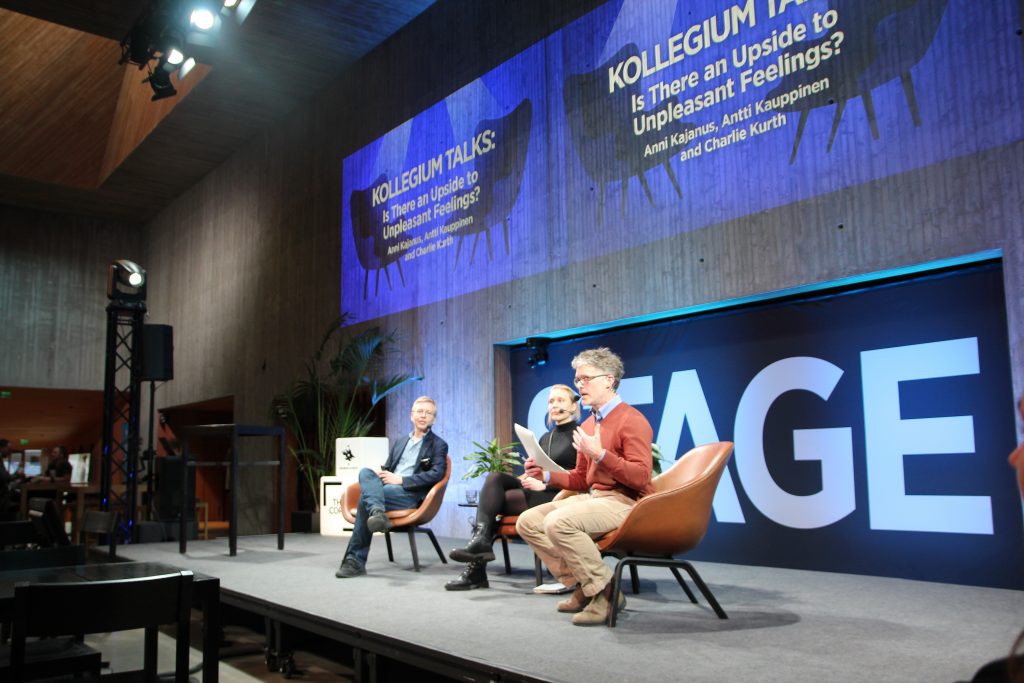By Kaisa Kaakinen
In March 2022, Kone Foundation granted extra resources to the Helsinki Collegium, to enable support for scholars who cannot continue to work in their home country due to the Russian invasion of Ukraine. Anton Kotenko, Sergei Medvedev and Anna Sokolova, all scholars recruited to HCAS in 2022, talked to us about the significance of the Kone Foundation fellowship for them and about the impact the war has had on the Russian research context.
The March 2022 Kone Foundation Fellowship call was open both to Ukrainian scholars, who could not stay and work in their home country due to the war, and to Russian academics who had to resign from their positions in Russia because of their opposition to Putin’s regime and the war. According to the current policy of the University of Helsinki, the Collegium cannot fund researchers, who are officially affiliated with a Russian institution.
The additional funding, enough for a total of 48 months of research time, was distributed through the Collegium’s ongoing Kone Foundation Fellowship program. This program has brought researchers from the Baltic countries, Russia, Belarus, and Ukraine to the Collegium already since the year 2004. Due to this existing structure, it was possible to recruit researchers quickly, and the first fellows began their terms at the Collegium in May 2022.
Among the first scholars arriving in the spring 2022 was Sergei Medvedev, who is known both as a political scientist and as an active columnist and broadcaster.
“I left Russia at the start of the war, which was a spontaneous but a long-awaited decision. It was a situation in which there were no other options left. I could not stay in Russia any single day longer, for moral reasons but also for safety reasons. But probably the moral reasons were prevalent.”
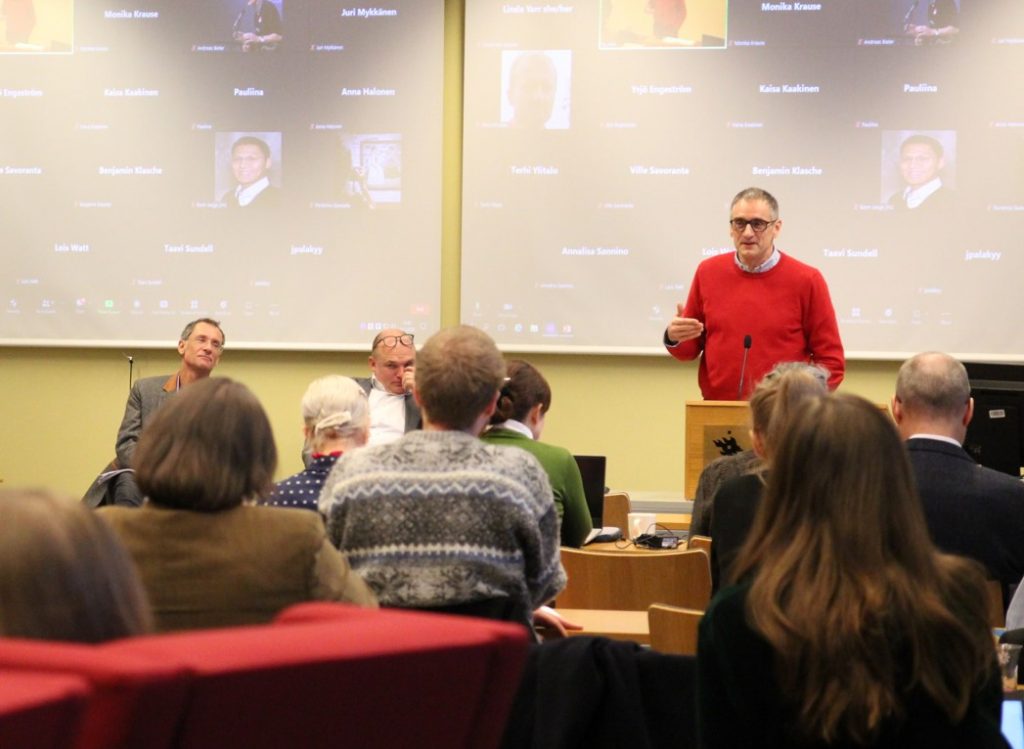
Sergei Medvedev giving a talk at the Collegium in January 2023.
It was a happy coincidence for Medvedev that the funding opportunity brought him to Helsinki, which is a research context that he knows from before and has come to appreciate. The Kone Foundation fellowship made it possible for him to both continue his career after resigning from Higher School of Economics in Moscow and to organize all the practicalities in a difficult life situation.
Anna Sokolova, scholar of Soviet history, notes that the Kone Foundation Fellowship call was a rare opportunity, because it was open also for Russian scholars, who had decided to resign from their positions and leave Russia. Sokolova and her family had left Moscow and moved to Yerevan, Armenia, soon after the beginning of the war.
“During those first months nobody really understood how many academics fled Russia. That was absolutely unexpected even for us. When my family arrived in Yerevan, we suddenly understood that there are lots of colleagues and friends around, and Armenians were extremely helpful and supportive. They were trying to do their best in this situation, but they were also not ready for such a huge number of colleagues arriving,” Sokolova explains.
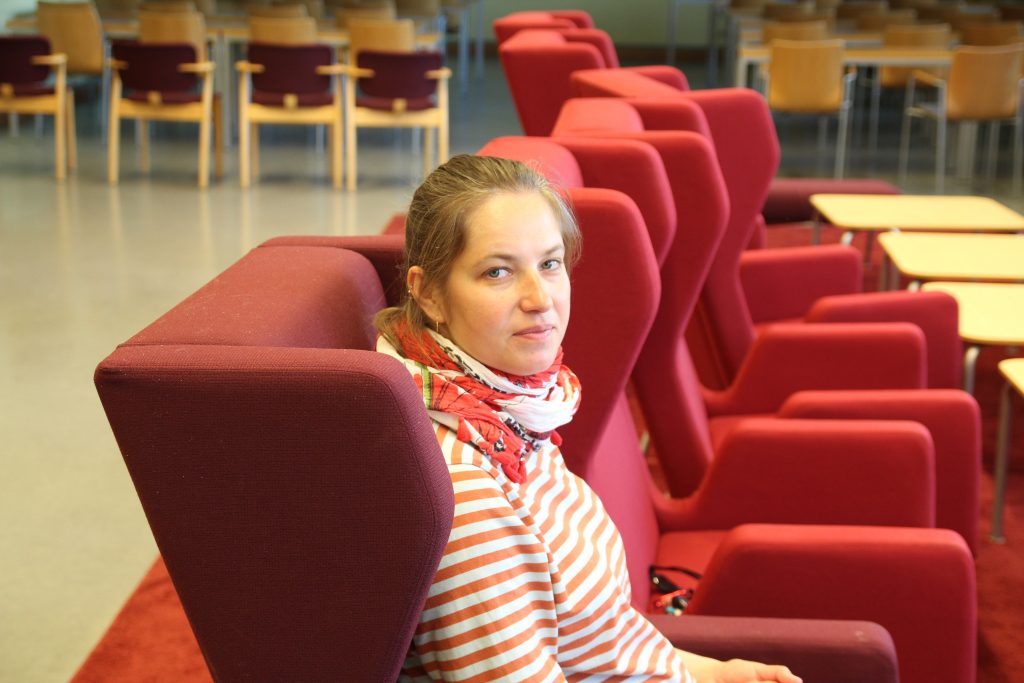
Anna Sokolova in the common room of HCAS
Sokolova is grateful for Kone Foundation and the Collegium for providing an academic safe haven in which it was possible to recover from the shock of the war and figure out what to do next. The fellowship at the Collegium gave her a sense of stability and security, which was the most important thing in the immediate aftermath of emigration.
“Since the war started, I was not sleeping, nor eating, and we understood that, although we do not know where we are going, we must leave. […] It might be hard to imagine that a single year of funding can feel like providing stability, but in our case it meant a really high level of stability in comparison to the situation of many other colleagues who have, like, two-month fellowships, forcing them to change countries and organize documents all the time,” Sokolova says.
Prospects for the future
One of the benefits of the Collegium as a host institution was that the incoming researchers could be immediately integrated into an active research community of scholars from various countries and disciplines. Anna Sokolova stresses that it was important for her to be surrounded by the supportive atmosphere at the Collegium, by the friendly communication and events, which forced her to connect with others and helped her not to concentrate on the dark side of the situation only.
Sokolova is working at the Collegium on her project “On the Edge of Socialism: State Institutes and Everyday Life on the Late Soviet Periphery”. She says that since the start of the war, she has seen her research topic in a new light, as she has come to perceive connections between the late Soviet period and contemporary Russia. She will continue her work in the fall 2023 with a one-year funding from the Finnish Cultural Foundation.
“I got great support with my application to the Finnish Cultural Foundation, which I had to submit in October, quite soon after my arrival. Hanne [Appelqvist] and Tuomas [Forsberg] explained to me that this is exactly what I should do right now, and I did. I am very grateful for them for pushing me to do that.”
Historian Anton Kotenko mentions that he has genuinely enjoyed the interdisciplinary setting of the Collegium.
“Being surrounded not only by historians of the nineteenth century Romanov empire, but by scholars studying such diverse topics as individual variations in perceptual chunking of spontaneous speech or general trust in society around you, makes one see the world in a whole new light.”
When the war broke out, Kotenko resigned from his previous position at the Higher School of Economics in St Petersburg. At the Collegium, he is finishing the project with which he applied to HCAS, a manuscript of a book on the history of Ukrainian national territorialization in the nineteenth century. Since the beginning of his HCAS term in October 2022, he has been able to secure further funding in the form of a three-year fellowship from the German Research Society. Kotenko is hoping that these two projects at HCAS and in Germany will become the first steps for relaunching his academic career in the next few years.
“In 2024 I will start working on the history of zoological gardens in the Romanov empire as a researcher at the Department of History of Heinrich-Heine-Universität Düsseldorf. And as far as Korkeasaari Zoo was opened in 1889, I hope to be back in Helsinki quite soon to look for the primary sources in the local archives related to its establishment and the first decades of its existence.”
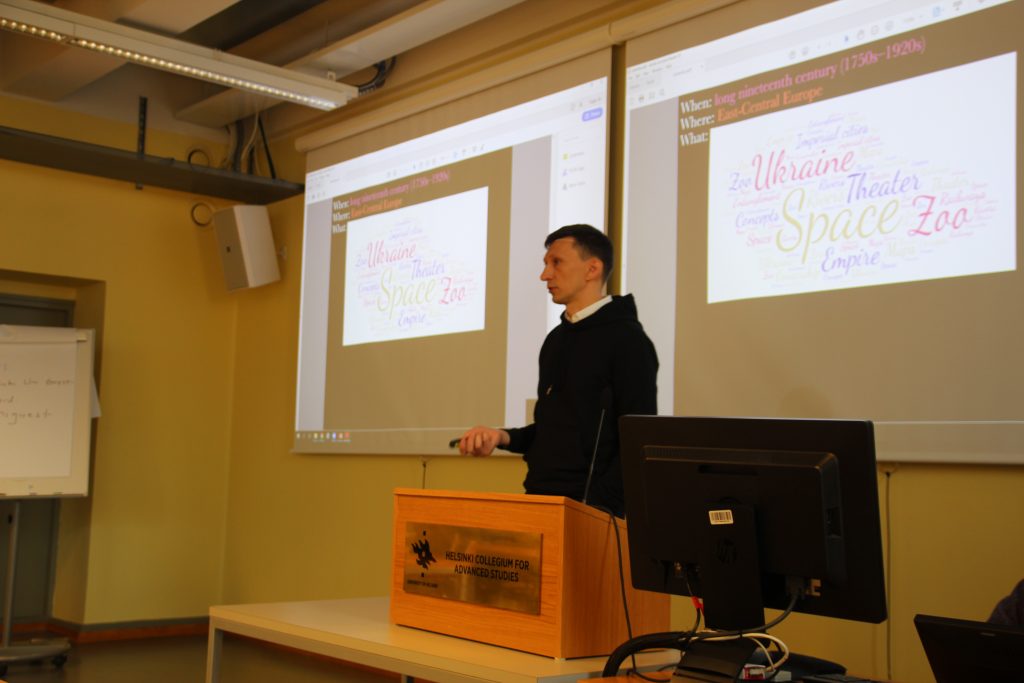
Anton Kotenko giving a talk at the HCAS orientation seminar in September 2022.
Kotenko is also actively involved with organizing an HCAS symposium for the fall 2023 on the validity of historical analogies and comparisons. The topic will be discussed in general theoretical terms but illuminated by reference to concrete cases such as the war in Ukraine, which has prompted different historical analogies by diplomats, politicians, scholars and journalists who have tried to explain the war and predict future developments.
During his year at the Collegium, Sergei Medvedev has been able to finish his book “A War Made in Russia”, forthcoming in the summer 2023 with Polity Press. Furthermore, he has been able to contribute actively as a columnist for several Russian-language exile media outlets.
In the fall 2023, Medvedev will begin work at Charles University in Prague as the academic supervisor of a new master’s program in Russian studies. For the past 15 years, he has been making a Russian-language television program called “Archaeology”, named after Michel Foucault’s archaeological method, which offers in-depth conversations with academics on current issues. In Prague, Medvedev will continue his work of hosting intellectual talk shows for Radio Liberty, which has its headquarters in Prague.
Emigration and the Russian research context
Sergei Medvedev points out that the Kone Foundation Fellowship at the Collegium has significantly contributed to the possibility of Russian academics to continue to work abroad after the recent political developments in Russia. He adds that the crisis situation has touched different fields differently.
“It is of course difficult to ruin entire schools and institutions that have been there for decades, but especially in my field, political science, the Russian research context has been ruined. Let’s face it, these days Russia is a fully grown classical fascist country. How can you do political science and think freely in a fascist state? You have to comply with the ideological dictate.”
While researchers in the natural sciences may still have good funding opportunities and a better chance to stay in Russia, also their lives have become precarious because all contacts abroad have been effectively banned and news about professors being reported to the police are abound.
Medvedev has followed the changes at his former university, Higher School of Economics in Moscow, which used to be the most international academic institution and one of the best schools in social and economic sciences in Russia.
“It is amazing to see how it is ruined from within. Since it is an important state institution, it is under the direct auspices of the presidential administration. The entire leadership has changed, and it is totally loyal to the war. There are war commanders coming there and talking to students, it has opened campuses in Luhansk in the occupied territory, there are recruitment points for students, and some of my ex-fellow professors are encouraging students to volunteer to go fight on the front. The university newspaper published reports about students who are fighting in Donbas on the Russian side operating drones and killing Ukrainians. It was just announced that there will be free education for anyone who participated in the war and for the children of those who are on the front. They are collecting money and goods for Russian soldiers at war, there are signs of propaganda at the university, without any reservation or shame. They have just joined the fascist operation. And this has been a global university where English speech could be heard just as often as Russian speech and with some Nobel laureates teaching. It is really striking to see such degradation in the educational scene in the matter of just one year, in an institution to which you belonged and where you worked for twenty years.”
Anna Sokolova points out that while the total percentage of researchers who have left Russia may not be very big, the ones who left are those scholars who were the most active and the most connected to international academia. “In some departments, they lost only one or two scholars, but in other departments everyone left.”
At the same time, there are many reasons why researchers opposing the current regime have been forced to stay, for instance, because they must take care of dependent persons such as their elderly parents. Sokolova finds it important to stay in contact on a personal basis with her former colleagues who are still in Russia – not with institutions but with individuals.
“Somehow I feel that my community is not complete without them, because we as a community of scholars in Russia were split in so many parts by this war, and I think if I can save any kind of connections in such a state of total disruption, it is very important both for us here and for them there,” she says.
Anton Kotenko hopes that the crisis of the war will galvanize studies of nineteenth-century Eastern Europe.
“Many problems that have been discussed since February 2022 have their roots in the age of empires, but unfortunately, these have not been properly studied. Hopefully, historians will realize that they must take more responsibility for the world around them and provide it with decent studies of the past, which will develop from a larger number of visionary research projects.”
